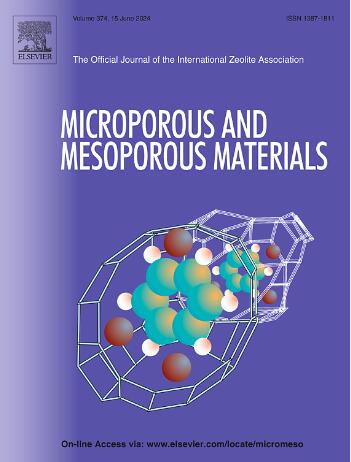Retention regularities of alkanols and other small organic molecules on 13X zeolite under HILIC conditions
IF 4.8
3区 材料科学
Q1 CHEMISTRY, APPLIED
引用次数: 0
Abstract
The retention regularities on a column packed with microspherical zeolite 13X particles were studied for different classes of compounds (alkanes, aromatic substances, oxygen-, nitrogen-, chlorine-, and sulfur- containing compounds) under conditions of hydrophilic interaction liquid chromatography (HILIC) using methanol and acetonitrile as mobile phases. In general, the retention (logk’) of studied substances having kinetic diameter less than zeolite pore size is proportional to their polarity. The retention of organic substances was compared for 13X and mesoporous silica columns. A special attention was paid to the retention of n- and iso-alcohols homologues, for which a electrostatically induced sieving effect was observed. It was found that retention factors (k’) of solutes on 13X depend strongly on flow rate of the mobile phases indicating the presence of kinetic selectivity effect for the micrporous adsorbent. For the first time the baseline separation was obtained for the low homologues of n-alkanols. Also, selective separation of methanol and methanol-d4 (selectivity α = 1.274; resolution of peaks RS = 1.32) is achieved on 50 × 4.6 mm I.D. column with acetonitrile as the eluent.

求助全文
约1分钟内获得全文
求助全文
来源期刊

Microporous and Mesoporous Materials
化学-材料科学:综合
CiteScore
10.70
自引率
5.80%
发文量
649
审稿时长
26 days
期刊介绍:
Microporous and Mesoporous Materials covers novel and significant aspects of porous solids classified as either microporous (pore size up to 2 nm) or mesoporous (pore size 2 to 50 nm). The porosity should have a specific impact on the material properties or application. Typical examples are zeolites and zeolite-like materials, pillared materials, clathrasils and clathrates, carbon molecular sieves, ordered mesoporous materials, organic/inorganic porous hybrid materials, or porous metal oxides. Both natural and synthetic porous materials are within the scope of the journal.
Topics which are particularly of interest include:
All aspects of natural microporous and mesoporous solids
The synthesis of crystalline or amorphous porous materials
The physico-chemical characterization of microporous and mesoporous solids, especially spectroscopic and microscopic
The modification of microporous and mesoporous solids, for example by ion exchange or solid-state reactions
All topics related to diffusion of mobile species in the pores of microporous and mesoporous materials
Adsorption (and other separation techniques) using microporous or mesoporous adsorbents
Catalysis by microporous and mesoporous materials
Host/guest interactions
Theoretical chemistry and modelling of host/guest interactions
All topics related to the application of microporous and mesoporous materials in industrial catalysis, separation technology, environmental protection, electrochemistry, membranes, sensors, optical devices, etc.
 求助内容:
求助内容: 应助结果提醒方式:
应助结果提醒方式:


